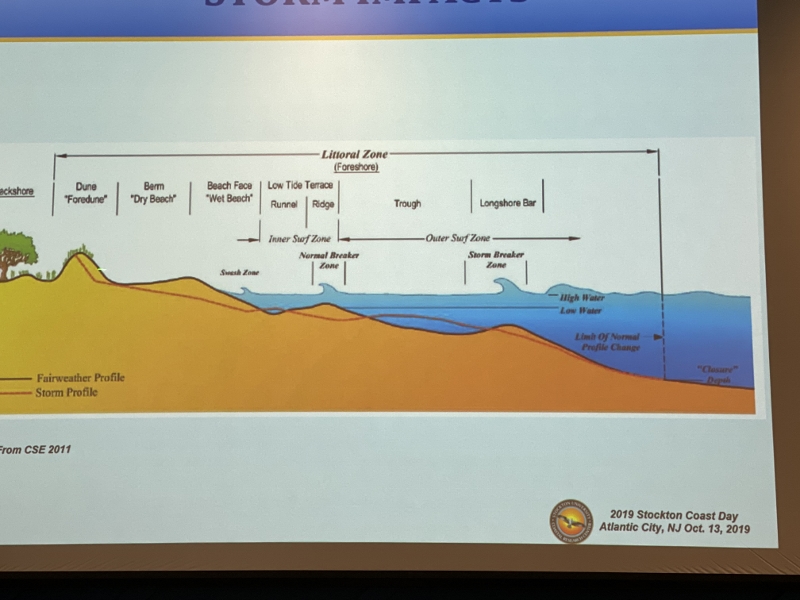 ATLANTIC CITY - Stockton University presented its second annual "Coast Day" event Sunday, Oct. 13 at its oceanfront campus.
ATLANTIC CITY - Stockton University presented its second annual "Coast Day" event Sunday, Oct. 13 at its oceanfront campus.
Students shared findings of their work at the Stockton Coastal Research Center and the university's marine science program, and displayed apparatus used to measure changes in the profile of the shoreline.
Students encouraged youngsters to write love letters to the ocean and participate in art projects set up on the veranda.
Atlantic City's famous power-broker Nucky Johnson made an appearance wearing his signature seersucker suit and red carnation boutonnière.
Atlantic City resident Sharon Stein, 65, said the event was enlightening.
"It was very informative," she said. "I'm very concerned about the environment, especially for our children. Even those who are older should be more concerned about protecting the earth."
Professor Kim McKenna from the Stockton Coastal Research Center spoke about what happens when storms hit the coastline and how sand migrates to other locations.

John Froonjian, interim executive director of the William J. Hughes Center for Public Policy at Stockton University, presented the findings of a new statewide poll on climate change and coastal issues.
The poll, recently completed by the Stockton Polling Institute compared statewide responses with responses from residents who live in the six coastal communities.
 John Froonjian
John Froonjian
According to survey results, two-thirds of New Jersey residents believe climate change is a crisis or a major problem and almost three-quarters believe it is affecting New Jersey now.
The telephone poll of 807 randomly selected adult New Jersey residents, conducted Sept. 18-29 showed 67% believe climate change is a crisis or major problem. A larger group, 73% , believe it is already affecting New Jersey.
The views of residents who live in counties along the shore or Delaware Bay (Monmouth, Ocean, Atlantic, Cape May, Cumberland and Salem) were statistically similar to those statewide. The poll has a margin of error of +/-3.5% statewide and +/- 4.1% coastal.
[rl_gallery id="11224"]
The results show climate change is a concern to people all over New Jersey and not just those who live along the Jersey shore, Froonjian said.
Among those who believe climate change is currently affecting New Jersey, more than 75% cited rising sea level, earth warming, harming or changing the ocean, extreme weather and worsening pollution as major problems. Beach erosion was cited by 70% as a major problem, while harm to farming was mentioned by 68%, flooding by 66% and health effects by 57%.
Sixty-four percent of respondents believe climate change is caused mainly by human activity and burning fossil fuels. Twenty-seven percent believe it is a natural occurrence.
More than half of respondents, 56%, believe government could or should do more, and 31% say the government response is totally inadequate. Ten percent believe the government response has been strong and appropriate.
Views did vary along party lines. Democrats, 92%, and independents, 64%,were more likely to see climate change as a crisis or major problem than Republicans, 35 %. Women, 72%, were also more likely to view it as a crisis or major problem than men, 62%.
The results also showed while young people are the most concerned about the issue, concern cuts across age, racial, ethnic, economic, gender and geographic lines. Almost 80% of respondents ages 18-29 see climate changes as a crisis or a major problem. That percentage drops to under 70% for those over 65.
Seventy-two percent said they believe flooding in the coastal zone of the state is a significant or serious problem. Just over half, 54%, would support local construction projects to reduce the threat of flooding, even if they had to pay higher taxes or fees. A larger group, 68%, would support limiting or restricting construction next to beaches and the ocean, and 85% would support building dunes to protect the shore even if they block the view of the ocean.
http://youtu.be/5SujcmbjFXw
A majority of respondents, 59% oppose drilling for natural gas or oil off the Atlantic Coast, while 80% said they would support wind turbines off the coast to harness wind energy.
We wondered whether those living near the water would feel differently about these issues than residents throughout the state, Froonjian said. But there was broad agreement across New Jersey. On almost every question, results in coastal areas were within a few percentage points of the statewide responses.
For full poll results, go to Poll Results